Sparks waterfalled to the concrete floor, spattered, guttered and died into nothing around my boots. The air was filled with the firework smell of welding and my face was sweaty and itching under my mask. The radio twittered away on the shelf but I hardly registered the newsreader’s dull, professional catastrophizing. I rarely did. The real world didn’t intrude here and that was just the way I liked it.
“You’ll need to grind that back.”
I straightened and accepted the mug Clem held out without replying. I knew it needed grinding. He knew I knew. I’d stopped being Clement Dalgleish’s apprentice and become his partner more than a year before, but the old man hadn’t changed much more than a pair of socks in all the time I’d known him.
I sipped the coffee, grimacing at the slightly oily taste, and checked over the rust repairs on the 1969 Morris Oxford, my sweat rapidly cooling in the chill air. When further commentary wasn’t forthcoming, I looked up to see Clem staring at the radio, his heavy white brows drawn together
“What’s wrong?”
“Nothing,” he grumbled, glaring into his own mug. “Just this shit.”
“The coffee?”
He grunted and jerked his head at the radio. I made myself focus on the flat, English voice.
“Whereas there has been no direct link established between the disappearance of what are now being called ‘Blood dealers’ and any registered haemophiles, anti-haemo protest groups are labeling them ‘revenge kidnappings’, executed in retaliation for the capture and abuse of haemophiles at human hands. Haemophile Blood-dealing is still a highly controversial topic, sparking heated debate on both sides with no satisfactory resolution in sight. The public is now demanding a review of the investigation into Shelly Morris’ murder, which is still popularly believed to be an act of haemophile violence.
“Haemophile spokesperson Ivor Novák has assured the government that all haemophiles registered in the UK abide by their registration laws and would never take matters into their own hands, but the human public remains far from reassured.”
I switched the channel. A jaunty pop tune rattled out of the tinny speaker. It set my teeth on edge, but the round lines of Clem’s large frame eased. He ambled back to the open bonnet of the 1964 Austin Healey and bent into the cavity. I stared at the radio a moment longer, something unwelcome ghosting under my belly, then shook my head and strode across the workshop to turn the bar-heater on.
“Any idea what that’ll do to the electric bill?” Clem grumbled from the depths of the Austin’s engine.
“It’ll be snowing before the end of the month,” I replied, taking the air filer from the tool rack. “Personally, I’d struggle to work if my fingers dropped off.”
“Wear gloves,” he retorted, but he was staring into the Austin’s engine and I knew he wasn’t even aware he was arguing with me.
I started to file back the weld on the Morris, relieved that whatever had been unsettled in the air had gone.
“Alec. Alec.” Clem had to bark my name twice before I heard him over the grind of the filer.
“What now?”
Clem nodded toward the front door. A dark, heart-shaped face framed by black curls was pressed against the glass, frowning into the dim interior. She waved as I approached the door, a smile warming her face.
“We’re closed.”
“Very funny,” came her muffled reply. “Let me in, will you? It’s bloody perishing out here.”
I unbolted and opened the door, shuddering in the gust of winter air that rushed in with her. “What are you doing here, Meg?”
“I’m on my way back to Glasgow,” she said, smiling that wide, brilliant smile of hers. “Been up to Inverness for a meeting.”
“You’re a long way off the A9.”
“So even social calls aren’t allowed anymore?”
My gaze slid over her shoulder to where Clem stood chewing on something and watching our exchange with interest. I nodded to an interior door and led her through to the cluttered kitchen.
“Uh, drink?”
“I’d kill for a coffee.”
I fired up the coffee machine. It rattled and shuddered as Meg shed her powder-blue coat and cashmere scarf.
“You’re looking thin, Alec,” she said. “Is everything okay?”
“Of course it is.”
“You’ve not been ill? The damp in that old place—”
“Meg”—I cut her off—“I’m fine. Was there something you needed?”
She pressed her lips together, her sloe-black eyes full of concern. “It’s just been a while. That’s all.”
“I’ve been busy,” I said, pouring coffee into our least filthy mug.
She wrapped her hands around it but didn’t drink. “So business is picking up?”
“It’s steady.”
“Well, that’s good news.” She raised the mug, sipped and her face twisted.
“Yeah, I know. It’s all the Aviemore Co-op stocks. But it’s strong.”
She took another careful sip. “I’ll need it if I’m gonna stay awake long enough to get home.”
“How’s everything with you?” I said, because all I could hear in the silence that followed was her waiting for me to ask.
Her smile broadened. “Good, thanks. Really good. I got the division leader position and we’re expanding. I get to hire an assistant.”
“That’s great.”
She narrowed her eyes. “You don’t even remember me telling you about the division leader job, do you?”
I raised my eyebrows. “’Course I do. You mentioned it the last time you rang.”
“Which was?”
“I don’t know. A few weeks ago?”
She raised her eyebrows. “Try three months, Alec.”
I fought a sigh. “I’m sorry. This place… It keeps me busy.”
“It keeps you isolated. Well, that and your nonexistent broadband.”
I clamped my mouth shut on the immediate reply. “Okay, Meg, you’ve checked in on me and I’m clearly alive. Is there anything else?”
She set the mug aside. “I just can’t get my head around why you barely come down anymore. It’s been forever since you and David—”
I scowled. “Meg—”
“Let me finish,” she said, firmly. “It was painful, sure. He hurt you. I know that. But cutting yourself off from all human interaction isn’t healthy.”
“What about Clem?”
“He barely qualifies as human.”
“And what if I’ve decided I don’t like humans?”
She sighed. “Believe me… I know how much my brother can screw people up. But when I think of you out here…” She cast her eyes around the messy kitchen then out of the window to the rolling hillside and the gray sky hanging low over the black mountains.
I took another long moment to marshal my response. “I like it here.”
“You never used to.”
“It’s different now.”
She nodded, but I could tell it was more in acknowledgement than agreement. “So long as you’re happy.”
I schooled my face. “I’m happy.”
“All right. I believe you. Just do me one favor?”
I eyed her warily. “What sort of favor?”
She flashed her smile again. “Get your best suit dry-cleaned. You’re coming to a club opening with me at the end of the month.”
I blinked at her. “I’m what?”
“A new nightclub. Lure. It’s opening right in the middle of Glasgow, a super-exclusive, members-only deal. It’s the Ogdell-Paiges’ newest project. The likes of Angus Mackie and Mayor Frederick are going.”
“Who?”
She tilted her chin. “Don’t be obtuse. This is a big deal, Alec.”
I pinched the bridge of my nose. “Don’t you think we’re a bit old for nightclubs?”
“Speak for yourself.”
“We’re the same age.”
“Uh, excuse me. I’m a full six months and four days younger.”
I sighed. “I don’t know—”
“Seriously”—she cut me off—“some of the top legal firms in the country are sending people, not to mention the politicians and business executives going for the social kudos. And I was the one who got the invite. Me. Not Bryce, not Sofia, but me, Megan Carlisle from Nowhere, Newtonmore.” Her face grew serious. “This is my chance to bring in some big-name clients of my own. It’s important, Alec.”
“Why do you need me?”
“For moral support. Because you know how to talk to these sorts of people. And, well”—she gave an awkward shrug—“because they want to meet you.”
Heat rose to my face. “They what?”
She held up her hands. “Don’t bite my head off, okay? Word got around that we were at primary school together. I met Olivia Ogdell-Paige at a conference and you came up in conversation…”
“The only reason anyone like that would want to meet me—”
She made an impatient gesture. “No one’s going to make a move on Glenroe, Alec. We’ve already established that legally no one can, though you still haven’t convinced me that it wouldn’t be a bad thing.”
I made an indignant noise.
“It’s not about the estate,” she said in a gentler voice. “They’re just interested in you.”
“I’m not interesting.”
“You’re coming with me, Alec,” she said firmly. “I want you to spend time with people. Real people. And, well”—her eyes softened—“I miss you.”
I chewed on that for a moment whilst glaring at the wall.
“Please?”
I let out a breath and nodded.
She beamed. “That’s the spirit. Here.” She produced a fountain pen and marked the Autospares calendar with a large X on the last Saturday of the month. “It’s official. And no hotels. Stay with me. Come for the whole weekend. We’ll make a proper thing of it. Okay?”
“Okay.”
She screwed the lid back on her pen in a deliberate manner. “Try not to jump too high in excitement, Lord Aviemore. You’ll pull a muscle.”
I fetched her coat but paused before opening the workshop door.
“What is it?”
I took a breath. “Have you heard from David?”
A pause. “Why?”
“Have you?”
“Please don’t put me in this position, Alec.”
“I just want to know he’s safe.”
“Safe?”
I ran my hand through my hair. “I heard on the radio that dealers are going missing in London.”
“Blood dealers. David was never into Blood. Was he?” she added, eyes widening slightly.
“No. But he was headed down a bad road.”
“He’s many things, but he’s never been a dealer, Alec…of any sort.”
“I know that,” I said, hearing the lie.
She chewed on the inside of her cheek for a long moment, her dark eyes haunted. “He’s fine,” she eventually said, “as far as I know. But we don’t talk much these days.”
I nodded and opened the door. Meg strode across the workshop floor, her neat heels clicking on the concrete. She turned at the front door, eyed Clem warily then leaned in and said in a low voice, “Look after yourself, you hear?”
“I will,” I said, trying for a smile of my own. She examined me for another long moment then kissed me on the cheek, briefly surrounding me with the delicate scents of cinnamon and coconut before returning to her sporty electric-blue Mazda. She waved again, then the car was zooming down the twisting lane, its roar gradually fading to nothing in the cold air.
“Sweet on you, that one is.”
“What?”
“She likes you,” Clem said. “Always has, by my reckoning.”
I tried to figure out if there was anything more than the usual truculence behind Clem’s words, but his face was as readable as bearded granite. I went back to smoothing down the body work on the Morris, refusing to think about what I’d gotten myself into.
Clem left when it started to get dark, repeating unnecessary reminders to lock up properly. I heard the cranky growl of his ancient Land Rover coughing to life, then the rumble as it drove away. I took a second to enjoy the utter silence that enveloped me—the silence that only ever came from being truly alone—then locked the workshop and made for the path leading up the hillside.
I bent my head against the wind. It smelled like snow. The winter-brittle grass hissed against my overalls. I startled a deer in a patch of scrubby heather. It bounded up the path and was gone.
Glenroe was little more than a darker patch of gray against the slate-colored slope of mountain. The boarded windows watched me like dead eyes. I reached the overgrown track that passed for the driveway and spotted a wooden plank splintered on the weedy gravel. Craning my neck, I spotted where it had fallen from—one of the windows in the turret on the west wing—and cursed.
Mentally logging the job for another day, I followed the track through the sprawling bushes around the side of the house. I was shivering by the time I got the key into the side door. I shut it on the swirling wind and stood for a second in the enclosed quiet. The passage was dark and the silence complete. I couldn’t even hear the scuff of rats in the walls. It was too cold even for vermin.
My footsteps echoed on the stone flags. I didn’t look into the faces of the dead people who smiled at me from photo frames on the walls whilst I strode through the dust-shrouded rooms to the kitchen. I hurriedly shut the door on the rest of the house and flicked on the light, the strip bulb humming as it came to life. The rickety table was covered with engine parts. The counters were piled with mismatched crockery, books and old copies of Classic Motor. There was a three-year-old calendar on the wall that I’d kept because I’d liked the photo of Buachaille Etive Mor that they’d used for July. Hiking up that mountain with David during our good summer was still one of my fondest memories, though I rarely admitted it, even to myself. I lit the wood-burning stove, switched on the kettle then the radio, clicking the channel over from another report of the London disappearances. I went through to my bedroom next door—what had been some of the old staff quarters—to change whilst the stove warmed water for a shower.
The wind was hammering at the windows when I emerged. By the time I was dumping my dirty dinner plates into the sink, I’d almost managed to forget about Meg. Then I caught my reflection in the darkened window. No wonder the sight of me had concerned her. My cheeks were hollow, my blue eyes lackluster and dull, the skin under them smudged gray. I scratched at a week’s worth of stubble and pushed back my over-long hair, scowled and turned away.












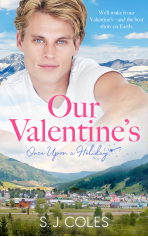

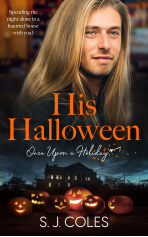
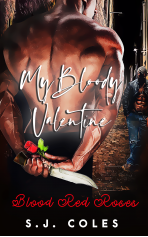
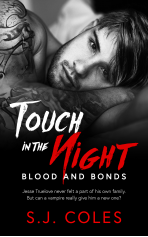
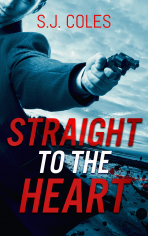



 Facebook
Facebook Twitter
Twitter